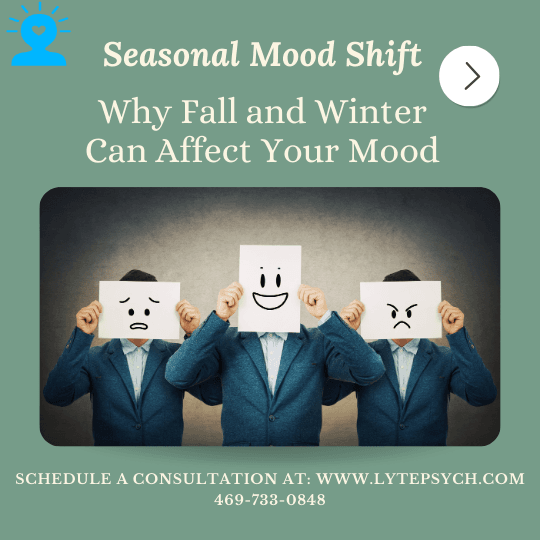Fri Nov 29 2024
Seasonal Depression: Why Fall and Winter Can Affect Your Mood at Lyte Psychiatry (Best Therapist and Psychiatrist Near You) Best Adults and Adolescents Therapist and Psychiatrist Near You, Dallas, TX

Seasonal Depression: Why Fall and Winter Can Affect Your Mood at Lyte Psychiatry (Best Therapist and Psychiatrist Near You)
As the days shorten and temperatures drop, many individuals experience changes in mood and energy levels. While it’s common to feel a little down during the fall and winter months, some people may suffer from Seasonal Affective Disorder (SAD), a type of depression that typically occurs during these colder months. At Lyte Psychiatry in Dallas, TX, we understand the complexities of seasonal depression and are dedicated to providing support and effective strategies for managing symptoms.
Understanding Seasonal Affective Disorder (SAD)
Loss of interest in previously enjoyed activities
Changes in appetite or weight
Fatigue or low energy
Sleep disturbances, such as oversleeping or insomnia
Prevalence SAD affects millions of people worldwide, with estimates suggesting that around 5% of adults in the U.S. experience it. The condition is more common in northern regions where daylight hours are significantly reduced during winter.
Why Fall and Winter Can Affect Your Mood
Biological Factors: The changing seasons can impact the body's levels of melatonin and serotonin. Melatonin, which regulates sleep-wake cycles, tends to increase in darker months, leading to feelings of lethargy and depression. Conversely, lower serotonin levels can contribute to mood swings and depressive symptoms.
Holiday Stressors: The holiday season can bring its own set of stressors, including financial pressures, family dynamics, and social expectations. These stressors can compound feelings of sadness and anxiety during an already challenging time.
Coping Strategies for Managing Seasonal Depression
Stay Active: Incorporate regular physical activity into your routine, even if it's just a short walk outdoors during daylight hours. Exercise can help boost mood by releasing endorphins and reducing feelings of anxiety and depression.
Maintain a Healthy Diet: Focus on a balanced diet rich in fruits, vegetables, whole grains, and lean proteins. Foods rich in omega-3 fatty acids, such as fish and nuts, can be particularly beneficial for mood regulation.
Practice Mindfulness and Relaxation: Engage in mindfulness practices, such as meditation or yoga, to help manage stress and improve overall well-being. These practices can enhance self-awareness and promote a positive mindset.
Seek Help and Professional Support at Lyte Psychiatry (Best Therapist and Psychiatrist Near You)
Seasonal depression can affect many individuals during the fall and winter months, but understanding its causes and implementing effective coping strategies can make a significant difference. At Lyte Psychiatry in Dallas, TX, we are committed to providing compassionate care and support for individuals facing seasonal depression and other mental health challenges. If you or someone you know is struggling with mood changes during the colder months, don’t hesitate to reach out for assistance.
To Schedule an appointment. Click Here
To see our services. Click Here
Call us if you have questions at 469-733-0848
FAQ
Q: What is Seasonal Affective Disorder (SAD)?
A: SAD is a type of depression that occurs at specific times of the year, typically in fall and winter, characterized by symptoms such as low mood, fatigue, and changes in sleep and appetite.
Q: How is SAD diagnosed?
A: A mental health professional conducts a comprehensive evaluation, including discussions about symptoms, their impact on daily life, and any seasonal patterns, to diagnose SAD.
Q: What treatments are available for seasonal depression?
A: Effective treatments include light therapy, psychotherapy (such as CBT), medication management, and lifestyle changes aimed at improving mood and overall well-being.
Q: Can I manage seasonal depression on my own?
A: While self-help strategies can be beneficial, seeking professional support is often essential for effectively managing seasonal depression.
Q: When should I seek help for seasonal depression?
A: If feelings of sadness or anxiety persist and interfere with your daily life, it is important to consult a mental health professional for guidance and support.